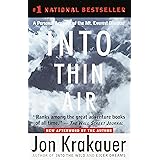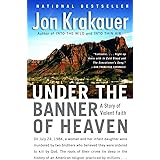
Download the free Kindle app and start reading Kindle books instantly on your smartphone, tablet, or computer - no Kindle device required.
Read instantly on your browser with Kindle for Web.
Using your mobile phone camera - scan the code below and download the Kindle app.

OK
 Audible sample Sample
Audible sample Sample 


The Climb: Tragic Ambitions on Everest Mass Market Paperback – July 15, 1998
There is a newer edition of this item:
On May 10, 1996, two commercial expeditions headed by expert leaders attempted to scale the world's largest peak. But things went terribly wrong. Crowded conditions, bad judgement, and a bitter storm stopped many climbers in their tracks. Others were left for dead, or stranded on the frigid mountain. Anatoli Boukreev, head climbing guide for the Mountain Madness expedition, stepped into the heart of the storm and brought three of his clients down alive. Here is his amazing story-of an expedition fated for disaster, of the blind ambition that drives people to attempt such dangerous ventures, and of a modern-day hero, who risked his own life to save others..
- Print length297 pages
- LanguageEnglish
- PublisherSt. Martin's Paperbacks
- Publication dateJuly 15, 1998
- Dimensions4.24 x 0.87 x 6.8 inches
- ISBN-100312965338
- ISBN-13978-0312965334
- Lexile measure1270L
Similar items that may deliver to you quickly
Editorial Reviews
Review
"One of the most amazing rescues in mountaineering history, performed single-handedly a few hours after climbing Everest without oxygen by a man some describe as the Tiger Woods of Himalayan climbing." --Wall Street Journal
"[The Climb] has a ring of authenticity that challenges the slickly written Into Thin Air...Compelling" --Minneapolis Star Tribune
About the Author
G. Weston Dewalt is a writer and investigative filmmaker who specializes in human rights issues, the confluence of humankind and the environment, and biography. His film Genbaku shi: Killed by the Atomic Bomb compelled the U.S. Department of Defense to acknowledge that American POWs had been killed during the atomic bombing of Hiroshima. He divides his time between Santa Fe, New Mexico, and London.
Product details
- Publisher : St. Martin's Paperbacks (July 15, 1998)
- Language : English
- Mass Market Paperback : 297 pages
- ISBN-10 : 0312965338
- ISBN-13 : 978-0312965334
- Lexile measure : 1270L
- Item Weight : 6.2 ounces
- Dimensions : 4.24 x 0.87 x 6.8 inches
- Best Sellers Rank: #2,829,249 in Books (See Top 100 in Books)
- #451 in Mountain Ecology
- #2,545 in Mountain Climbing
- #13,591 in Traveler & Explorer Biographies
- Customer Reviews:
About the authors

Discover more of the author’s books, see similar authors, read author blogs and more

Discover more of the author’s books, see similar authors, read author blogs and more
Customer reviews
Customer Reviews, including Product Star Ratings help customers to learn more about the product and decide whether it is the right product for them.
To calculate the overall star rating and percentage breakdown by star, we don’t use a simple average. Instead, our system considers things like how recent a review is and if the reviewer bought the item on Amazon. It also analyzed reviews to verify trustworthiness.
Learn more how customers reviews work on AmazonReviews with images
-
Top reviews
Top reviews from the United States
There was a problem filtering reviews right now. Please try again later.
Overall, I'm glad I read this book and feel as though I have a better understanding of both sides of the story and controversy.
When I first began reading "The Climb", it felt like somewhat of a rebuttal to "Into Thin Air" and it's evident that there are passages throughout the book that are meant to defend against statements made in Krakauer's account. In fact, I firmly believed I would not like the book because of Krakauer's interpretation of Boukreev's behavior on the mountain.
After completing this book, I re-read Krakauer's book and felt that his criticisms of Boukreev were a bit harsh, particularly harping on Anatoli's choice to not use oxygen. Most formidable high-altitude mountain guides DO use oxygen when guiding even if they choose not to use when they are climbing for their own pleasure and doctors will tell you that it's ludicrous to believe that one would be better off or even as well off without supplemental oxygen as they would with it; however, most experienced high-altitude mountaineers will also tell you that being on oxygen and running out is WORSE than never having used oxygen at all. Eric Simonson has said that running out of oxygen at high altitude is equivalent to putting your head inside a plastic bag and duct-taping it around your neck. Anatoli always stated that, as a guide using oxygen, he might need to give it up his oxygen (which he did carry) to a needy client which would greatly hinder his ability to guide. Boukreev was one of those rare humans who are physiologically suited for high altitude and besides, at no time did Anatoli's lack of oxygen have any bearing on the way he guided that day.
It's evident from reading his book that Boukreev firmly believed if you were on Mt. Everest then you should be capable of climbing it. He was very much against the idea of "babysitting" clients with questionable mountaineering skills up a mountain that they had no business being on. One odd thing about Boukreev is that he was almost like half-Sherpa and half-guide. He assisted with hauling gear to the higher camps and fixed rope in several difficult areas along the route. Krakauer seemed to exaggerate the altercations that Anatoli had with Scott Fischer, however, Krakauer was able to see that Fischer was being affected by the altitude where Boukreev recognizes that Fischer is tired, but still trusts Fischer to make crucial decisions on summit day, the biggest of which was allowing Boukreev to descend ahead of the clients to prepare provisions for the climbers in the event that he needed to head back up the mountain in a rescue effort. Of course, one detail that Krakauer left out or wasn't aware of was that Boukreev believed that the team had NO sherpas left at Camp IV and that someone would need to prepare tea for the exhausted incoming climbers and insure that they got oxygen, hydration, etc. Also, if a rescue from Camp IV were necessary, he needed to rehydrate and rest himself in order to go back up the mountain. As we all know, this is exactly what occurred. So, it may have been flawed thinking, but he BELIEVED that he was doing the right thing and it was agreed upon between he and Fischer that this would be the plan. If he can be faulted at all, it might be for not recognizing that Scott Fischer was probably incapable of making a clear decision in his altitude-affected state. That being said, Scott Fischer was not one to let on that he was hurting and he was Boukreev's boss. Many of us don't question our bosses when we believe they may be making a bad decision.
After re-reading "Into Thin Air", I realized that there were big gaps in Krakauer's account, not the least of which is his trek from the top of the Hillary Step to the South Summit without oxygen. In Krakauer's book, he mentions how Andy Harris has turned his oxygen up instead of down like he asked him to do and then he ran out of oxygen. Then he says that the "Step" cleared, he went down and then he goes into his encounter with Andy Harris at the South Summit oxygen cache. In "The Climb", Boukreev tells of how Krakauer nearly fell to his death stumbling across the unroped area along the South ridge in his oxygen-deprived state. Krakauer never makes mention of this and probably because he doesn't remember it. Let's not forget that Krakauer thought Martin Adams was Andy Harris and actually communicated to Base Camp that Harris had safely returned to Camp IV when, in fact, Harris was somewhere around the South Summit.
It is my opinion that Krakauer was much more severely affected by the high altitude on that day than Boukreev was and, as a result, I trust Anatoli's memory of the events more than I do that of Krakauer even if "The Climb" was written in rebuttal to "Into Thin Air". It goes without saying that had Anatoli not guided the mountain in the manner which he did, that more people would have died in those days and the altitude-affected recollection of John Krakauer isn't enough to convince me that the opposite is true. One thing that all climbers on that mountain will agree on is that if there is a villain in this tragic story, it was Ian Woodall, leader of the South African expedition.
I truly loved reading Boukreev’s memoir. He provided an inside look at mountain climbing that I had not been aware of before. The main portion of the book is simply describing events as he remembers them. He doesn’t place blame on anybody for what occurred that day and he doesn’t question that actions of others (like a certain Jerkauer does in his book). It appears that he just wants to have his voice heard and to share his story about what happened. He also wanted to pay tribute to those who lost their lives that day. Scott Fischer and Rob Hall were very important people in the commercialization of mountain climbing and this tragedy affected Boukreev deeply, as well asthe loss of Namba, who Boukreev felt deep personal guilt over.
In this version of the book, there are several documents after the book actually ends which are interesting to read. An In Memoriam for Boukreev who passed away in 1997 and a few responses to Krakauer’s book. Krakauer does not come off well in this part. It’s very respectfully done, but to me, Krakauer comes off as kind of like an arrogant baby. What we have to remember with these memoirs, is that it is all memories. At that altitude and given the events of the day, memories can become eschewed. It’s very likely that these men remembered the story differently, but to them, it was the truth.
Overall, this was a very interesting read. I loved hearing Boukreev’s perspective on the events and about his experiences both that day and otherwise. He’s not the bad guy, and he felt he was represented in that way and this gave him an opportunity to show that he’s not. He’s responsible for having saved at least 3 people that day. That doesn’t sound like a bad guy to me. If you’re interested in the Everest disaster, this should definitely be one of the memoirs that you check out!
Top reviews from other countries
時はかなり過ぎ去ったが、エベレストでのこの大量遭難の実話、とりわけブクレーエフの立場からの話に興味を惹かれている。自分にとっては宝になりうる本。












